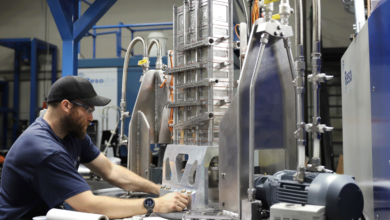AI Sales Automation: The Future of Smarter and Scalable Selling

In today’s hyper-competitive market, sales teams are under constant pressure to do more with less. Generating quality leads, nurturing prospects, and closing deals require time, effort, and precision. Yet, traditional sales methods often leave professionals overwhelmed with repetitive tasks, making it difficult to focus on what truly matters: building relationships and driving revenue.
This is where AI sales automation steps in. By blending artificial intelligence with automation, businesses can streamline workflows, optimize decision-making, and create personalized customer experiences at scale. For modern organizations, adopting AI in sales isn’t just a competitive advantage—it’s quickly becoming a necessity.
This article explores what AI sales automation is, its key features, benefits, challenges, and how businesses can implement it effectively.
What Is AI Sales Automation?
AI sales automation refers to the use of artificial intelligence to automate and enhance sales processes. Unlike traditional automation that only handles repetitive tasks, AI adds intelligence by learning from data, predicting outcomes, and making recommendations.
It helps sales teams prioritize leads, personalize interactions, and close deals faster by analyzing customer behavior, predicting buying intent, and even drafting tailored communications.
In simple terms, AI sales automation makes sales smarter—not just faster.
Why AI Sales Automation Matters
Handling Data Overload
Sales teams collect enormous amounts of data from CRMs, emails, social media, and customer interactions. Manually analyzing this data is impossible. AI filters, interprets, and translates it into actionable insights so sales reps can make informed decisions.
Boosting Productivity
Instead of spending hours on administrative work like scheduling, data entry, or follow-ups, AI automation handles these tasks. Sales teams gain back valuable time to focus on relationship-building and closing deals.
Improving Customer Experience
Modern buyers expect personalized interactions at every touchpoint. AI tools analyze customer data to provide tailored recommendations, messages, and offers, making prospects feel valued and understood.
Key Features of AI Sales Automation
1. Lead Scoring and Prioritization
AI analyzes customer behavior, demographics, and past interactions to assign scores to leads. This ensures sales reps focus on high-potential prospects rather than wasting time on cold leads. Predictive lead scoring increases conversion rates and shortens the sales cycle.
2. Personalized Outreach
AI-powered platforms can craft tailored messages for each customer segment by analyzing preferences and behavior. Whether it’s an email, LinkedIn message, or SMS, AI ensures communication feels relevant and timely.
3. Chatbots and Virtual Assistants
AI chatbots engage prospects 24/7, answering queries, booking demos, and nurturing leads. These assistants handle the early stages of the sales funnel, freeing up human reps for high-value conversations.
4. Sales Forecasting
By analyzing historical sales data, market trends, and customer behavior, AI predicts future outcomes with remarkable accuracy. This helps businesses plan inventory, allocate resources, and set realistic targets.
5. Automated Data Entry
Manual CRM updates are time-consuming and error-prone. AI automation captures and logs data from emails, calls, and meetings directly into the CRM system, ensuring accuracy while saving reps hours of work.
6. Intelligent Scheduling
AI tools sync calendars, analyze availability, and suggest optimal meeting times for both parties. Automated scheduling reduces back-and-forth communication and helps sales teams engage prospects faster.
7. Sentiment Analysis
AI tools can analyze customer emails, call recordings, or chats to gauge sentiment. Knowing whether a customer is enthusiastic, neutral, or skeptical helps sales reps adjust their approach accordingly.
See also: Steps Toward a More Energized and Joyful Life
Benefits of AI Sales Automation
Enhanced Efficiency
Automating repetitive sales tasks allows teams to handle more accounts in less time. From lead generation to post-sales follow-up, efficiency improves across the entire sales pipeline.
Smarter Decision-Making
AI turns raw data into predictive insights. Reps know which leads to pursue, what offers to make, and when to engage. This data-driven decision-making improves win rates.
Personalization at Scale
Instead of sending generic pitches, AI ensures every prospect receives communication tailored to their specific needs and preferences. This level of personalization improves engagement and builds trust.
Reduced Sales Cycle
With faster lead qualification, personalized outreach, and instant responses through chatbots, prospects move down the sales funnel quicker, reducing the time it takes to close deals.
Better Sales Forecasting
Accurate forecasts allow businesses to set realistic sales goals and optimize resources. Teams are better prepared for demand fluctuations and market changes.
Improved Customer Satisfaction
AI ensures timely, relevant, and accurate communication with customers. When prospects feel understood and valued, satisfaction—and loyalty—rises.
Implementing AI Sales Automation
Step 1: Define Your Goals
Businesses must identify the specific sales challenges they want AI to solve. For example, is the goal to generate more qualified leads, improve follow-up consistency, or reduce manual data entry?
Step 2: Audit Existing Tools
Companies should review current CRM and sales software to determine integration needs. Many AI sales automation tools are designed to work with popular platforms like Salesforce, HubSpot, or Zoho.
Step 3: Choose the Right Solution
The market offers a wide range of AI sales automation tools, from chatbots to predictive analytics platforms. Businesses must select solutions that align with their goals, budget, and scalability needs.
Step 4: Train Your Sales Team
AI works best when teams know how to leverage it. Training ensures reps understand how to use AI insights, trust its recommendations, and adopt it as a daily tool rather than a replacement.
Step 5: Start Small and Scale
Instead of automating the entire sales cycle at once, businesses should start with one process, such as lead scoring or email automation. Once successful, they can scale AI integration across other sales functions.
Step 6: Monitor and Optimize
AI is not a “set it and forget it” solution. Regular monitoring ensures the system continues to deliver value, while optimizations improve accuracy and outcomes over time.
Challenges of AI Sales Automation
Resistance to Change
Sales reps may fear AI will replace their jobs. Companies must emphasize that AI is a support tool that enhances human performance, not a replacement.
Data Quality Issues
AI’s effectiveness depends on the quality of the data it processes. Inaccurate or incomplete data leads to poor predictions. Businesses must invest in data cleaning and governance.
Integration Complexity
Integrating AI tools with legacy CRMs and existing infrastructure can be technically challenging. Expert guidance and phased rollouts often ease the process.
Cost of Implementation
While AI sales automation saves money in the long run, the upfront investment can be significant. Companies need a clear ROI plan to justify the expense.
Security and Privacy Concerns
AI systems handle sensitive customer data, raising concerns about security and compliance. Strong data protection measures are essential to maintain customer trust.
The Future of AI Sales Automation
As AI technology continues to advance, the future of sales will be more predictive, personalized, and efficient. Emerging trends include:
- Conversational AI: More sophisticated chatbots capable of handling complex customer interactions.
- Generative AI: Tools that can create hyper-personalized sales content, from proposals to presentations.
- Voice AI: AI assistants analyzing sales calls in real time to provide reps with instant recommendations.
- AI + IoT: Integration with smart devices to gather customer data and predict buying behavior.
- Explainable AI: Transparent algorithms that allow sales teams to understand why AI makes specific predictions.
Businesses that adopt AI sales automation early will gain a lasting advantage, while those that delay risk falling behind competitors.
Conclusion
AI sales automation is redefining how businesses approach selling. By combining intelligence with automation, companies can eliminate repetitive tasks, improve personalization, and close deals faster.
From lead scoring to predictive forecasting, AI empowers sales teams with actionable insights that drive better results. While challenges like cost, integration, and resistance to change exist, the long-term benefits are undeniable.
In the coming years, AI sales automation will move from being a competitive edge to an industry standard. Businesses that embrace it now will not only achieve higher efficiency and revenue but also deliver exceptional customer experiences.




